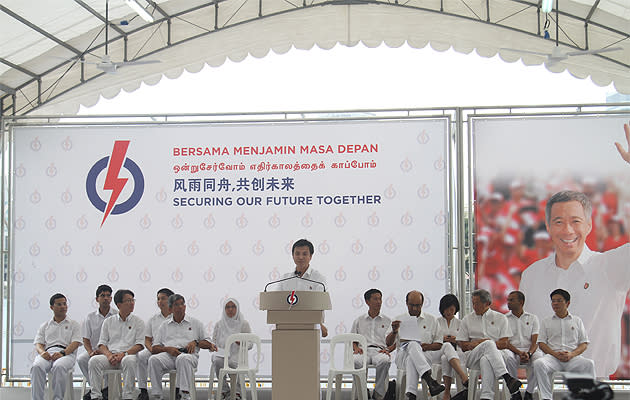COMMENT: It’s definitely time to debate GRC system, consider alternatives
Kirsten Han is a Singaporean blogger, journalist and filmmaker, currently a Masters student at Cardiff University. A social media junkie, she tweets at @kixes. The views expressed below are her own.
Human rights group Maruah called for an end to the Group Representative Constituency (GRC) system on Monday, proposing a return to Single Member Constituencies (SMCs) with a failsafe to ensure minority representation in Parliament.
Discussions over the GRC system have flared up and died down over the years – especially every time we have an election – and there has been no shortage of criticism. With the launch of Maruah’s report, is it time for us to really think about how we vote?
#AskTheTweeps Is it time for us to get rid of the GRC system? How can we ensure minority representation?
— Kirsten Han (@kixes) August 22, 2013
Some Singaporeans on Twitter felt that there was no longer a need for the GRC system as the electorate would not vote according to ethnicity, but the quality of the candidate.
@kixes question is, why the stress on minority representation? Is the G saying that w/o GRCs, no minority candidates will enter parliament?
— Low (@1nineeight3) August 22, 2013
@kixes does the G think parties will not field minority candidates? Or that citizens today judge not based on merit, but skin colour?
— Low (@1nineeight3) August 22, 2013
@kixes so what message exactly does the GRC system convey? Does it represent racial equality or rather, racial inequality?
— Low (@1nineeight3) August 22, 2013
@kixes yes. Why do we need minority representation when all our lives we are preached on equality and racial harmony?
— ☆ Celine ☆ (@sexybull26) August 22, 2013
@kixes by wanting minority representation is it implied there is racial discrimination? Or there might be?
— ☆ Celine ☆ (@sexybull26) August 22, 2013
Personally, I find minority representation to be very important in Singapore; the majority (often blind to its own privilege) already dominates the discourse way too much as it is. Minority representation in Parliament is one way to make sure that minority struggles and perspectives don't get left out of national policies.
Yet some also point out that political representation is not a sure-fire way to end discrimination in Singapore:
@kixes obviously minority parliamentary representation is not the end-all or even a substantial part of countering systemic discrimination
— Daddy Dãndy (@avelokiteshvara) August 22, 2013
Other tweeps mentioned issues with the GRC system beyond minority representation: GRCs have also led to a situation where the ruling party won over 90 per cent of the seats with only about 60 per cent of the vote, which raises issues about whether the electorate has been properly represented.
@kixes Of course it's time to get rid of it. Opposition: 40 per cent of votes in 2011, only 8 per cent of MPs. Something is wrong.
— Eisen (@eisen) August 22, 2013
@kixes honestly, I don't know how to ensure minorities will run for elections if GRC is scraped. But I think 5 members GRC is too big.
— H.Y 慧怡 (@tanhuiyi) August 22, 2013
@kixes Independent zone voting. Everywhere should be SMC. NO changes to political zone at all.
— Benjamin Poh (@benjapoh) August 22, 2013
Plenty of the criticism that has revolved around the GRC system has to do with the fact that many Singaporeans are skeptical of the claim that it's in place to ensure minority representation, believing that it has more to do with gerrymandering and giving the incumbent the upper hand.
It certainly seems the case: it can be very difficult for alternative parties to field teams to contest GRCs with their limited resources (just think about how expensive it is to put down the deposit for a candidate!), and the practice of sending a minister to anchor the PAP's teams can be seen as a way to win more seats by having inexperienced candidates ride into Parliament on the coat-tails of stronger politicians.
Furthermore, the GRC system requires voters to weigh entire teams and make trade-offs rather than vote for the actual candidate that they want to represent them. Instead of just considering the one person they want as their MP, voters have to think of the entire team and vote for the party slate.
So perhaps it's time for us to abandon the GRC system. But what can we have instead?
@BB_See on Twitter shared a video explaining the Alternative Vote (AV) system, and how it negates the spoiler effect that plagues the First Past The Post (FPTP) system.
@kixes @cgpgrey suggested a very interesting alternative http://t.co/ECEIgXOzHC
— BB (@BB_See) August 22, 2013
Could Singapore adopt such a voting system? If we had the AV system, alternative parties would not need to come up with pacts to mark out turfs so as to avoid three-cornered fights, and Singaporeans would have a higher chance of seeing the candidate/party they want represented in Parliament. Yet how would this work in a way that would assure minority representation?
Other suggestions were made on Facebook, such as Singaporeans simply voting for the candidate they want without the electorate being divided up into constituencies. The idea of removing town council management from the duties of MPs was also mooted – a fair suggestion considering that the parliamentary duties of MPs are vastly different from the everyday work of maintaining housing estates, and a person might not be cut out to do both.
It's an interesting problem without a single answer. But one thing is clear to me: untested or incompetent candidates should not be able to get a free ride into Parliament on the merits of their GRC team-mates, and the GRC system has not brought us the political representation we should have in Parliament. Although it is true that other voting systems might have their own pitfalls, a conversation about alternatives to the GRC system can only be good for Singapore.


